Peking University, November 9, 2020: How would a contemporary French writer perceive poems from the ancient Chinese Tang Dynasty? The collaborative work between the Nobel Prize-winning French novelist Jean-Marie Gustave Le Clézio, and Peking University's renowned calligrapher, translator and scholar of Chinese and French literature, Dong Qiang, offers clues to the answer. The duo's book, Le flot de la poésie continuera de couler (Poetry is a Stream that Continually Flows), discussed the writings of Tang dynasty poets (618-907), like Li Bai and Wang Wei, and how their experiences touch us today.
To discover what goes behind this collaboration, we had a chat with Professor Dong Qiang about the motivation, planning and expectations of this ground-breaking work.
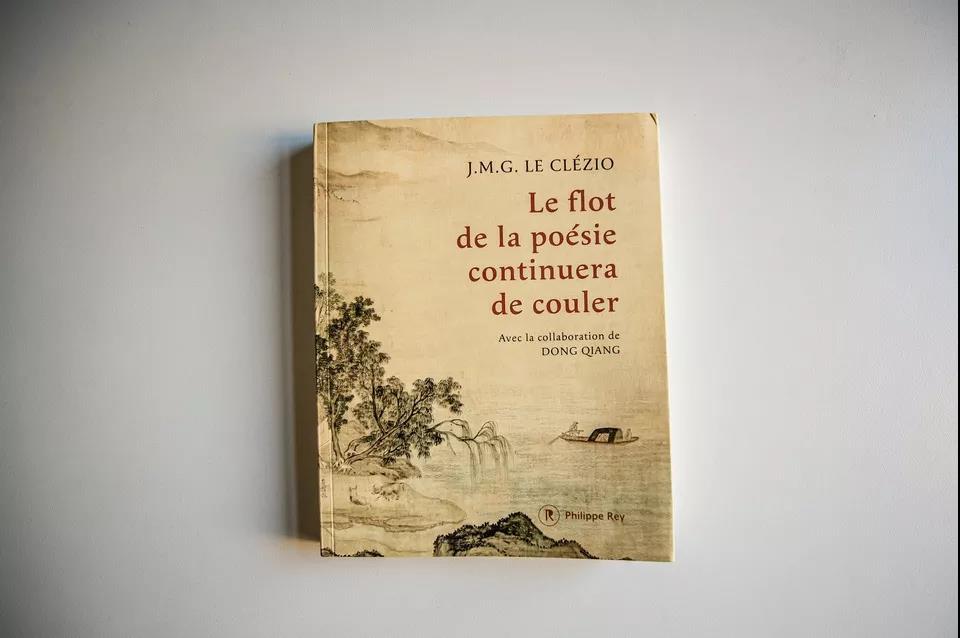
"This book bears witness to a thirty-year-long friendship between Le Clézio and me," herewith is how the story started as Professor Dong bagan the conversation while having a beaming smile in his face. The two had their first chat in a Paris café when Dong was studying under Milan Kundera at EHESS (École des hautes études en sciences sociales), and they quickly got along with each other well, both having deep interest in each other's national cultures.
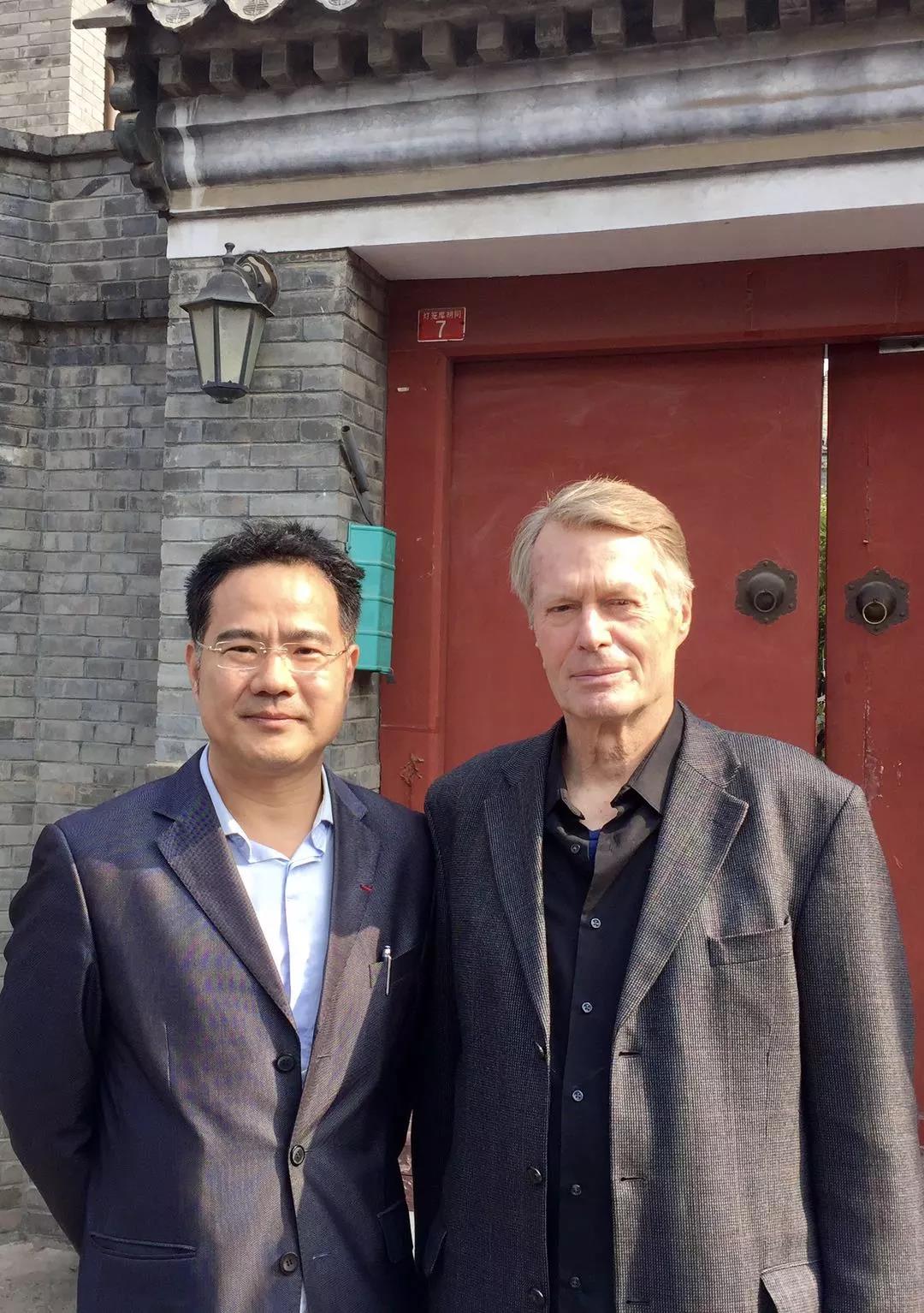
Le Clézio visiting Dong's study in Beijing
Despite having countless hours of discussions about Chinese classical and contemporary literature, they never thought of writing a book together on the subject until now. The idea first took shape during their tour to the Thatched Cottage of Du Fu in Sichuan last November. Since the Tang Dynasty poems are Le Clézio’s favourites, Dong considered compiling a selective collection of those poems considered as relevant and enjoyable as travel companion for Le Clézio’s future trips to China. After inquiring for his friend’s preferences, Dong was impressed by Le Clézio’s novel interpretations of those poems, and he thought to himself: “Why not record such unconventional readings of Chinese literature by the most influential French novelist of our age?” As exuberant as they were, the two discussed the idea till nightfall. They decided to write a piece in the form of dialogues and planned to visit the Road of Tang Dynasty Poems in Hangzhou, Professor Dong’s hometown, in order to draw inspiration.
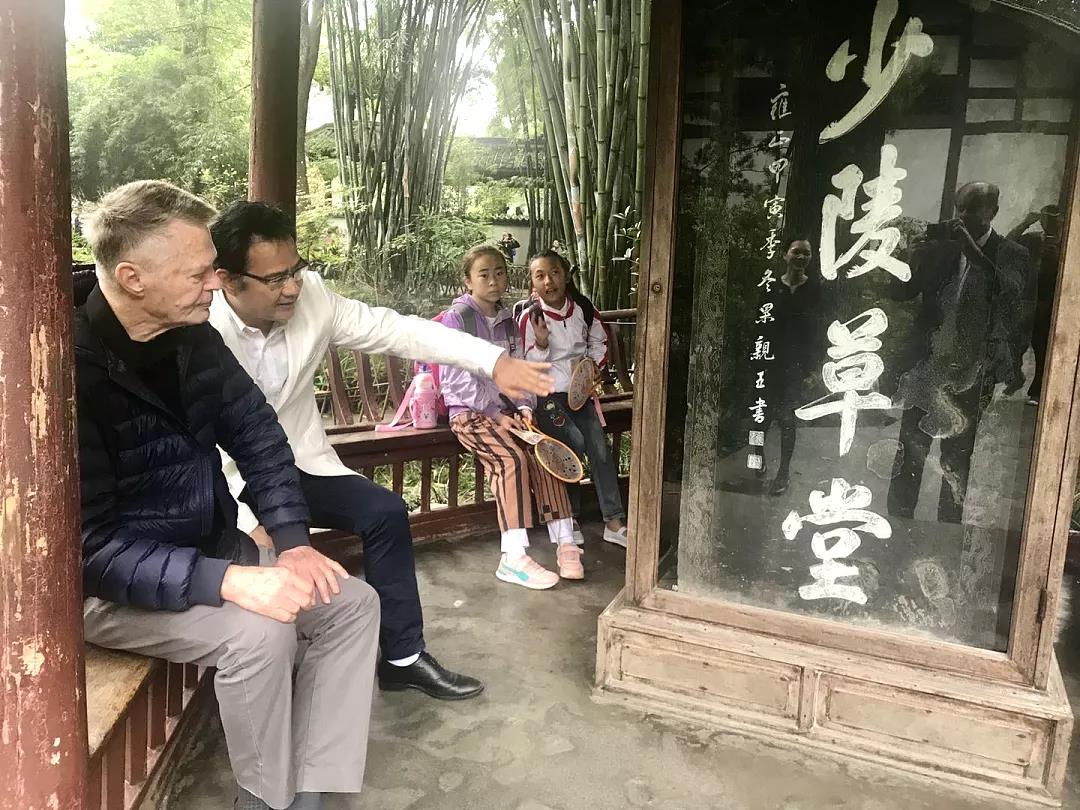
Dong and Le Clézio at the Thatched Cottage of Du Fu in Si Chuan
However, the outbreak of COVID-19 in China and the government's policies to control its spread stalemated their trip. Nonetheless, the duo continued writing their piece. Following their publisher's suggestions to write in a form other than dialogues, Le Clézio developed and shared with Dong an essay detailing his thoughts on over a hundred Tang era poems. "I was initially surprised at his novel readings of poems known to me since childhood, and more surprised when, at some points, I could not make out the poems he was describing," said Dong. The professor translated the Chinese texts to French to revise the segments that were difficult to recognize and to maintain the work's poetic imageries, which he shared with his French colleague.
After three months of translating texts, Dong began enriching the book with cultural contexts to the selected poems. He also decided to add some relevant illustrations, including pictures of his own calligraphy of the poems. Although Dong believed that pictures were essential to beautify the book, he took care to maintain a perfect balance with the literary contents. Dong also wrote his own comments which, though initially intended as a preface, were eventually incorporated as part of the book as the publisher insisted.

The whole process of editing and re-editing was done via email. "It was a brand new and beautiful experience; it felt like a piano duet," commented Dong. This cyber piano duet played its final note in October, and the French edition is scheduled for publication on November 5, 2020. "We half could not wait, and half could not believe that it finally got published until we saw our publisher's message." reflected Dong.
Since the Chinese edition will not be published until around the end of the year, Dong shared with us how Le Clézio and himself understood Tang Dynasty poems. "His favourite poet is Li Bai, and I think he finds an echo of himself in this Chinese figure – both are literary geniuses and world travellers, and both have a somehow rebellious spirit towards social norms and doctrines," Dong said. The very first Tang Dynasty poem Le Clézio read was Sitting Alone in Jingting Mountain by Li Bai, which was the start of his long-time passion for this genre and period. According to Dong, "In his [Le Clézio] eyes, the poem reveals the unique Chinese attitude towards nature: a sense of respect and humility. He saw the Tang era's poems as contrasting many French works of literature where one often finds expressions like 'conquer the Alps' or 'conquer Mount Everest.' Never before had he heard of anyone sitting quietly before a mountain, befriending it, and enjoys its company for the day. After reading that poem, his first impulse was to find a mountain and sit at its foot."

Dong giving a performance of calligraphy for Le Clézio in Si Chuan Library
Also, Le Clézio appreciated Du Fu's works, whose humanitarian concerns struck him as a stark contrast with the relatively Western focus on "Je" — the French word for "I", meaning a tendency for egocentricism.
Dong considered Le Clézio's readings as valuable, original, thought-provoking, and sincere; raw ideas worth preserving. Yet, he also admitted that his co-author's interpretations might sometimes prove deviant. "His interpretations are not without errors partly because of the sometimes elusive translations available to him, and partly because of the great lapse in age and culture." This is visible in the title of the French edition, where Le Clézio misinterpreted Li Bai's epitaph by the Tang poet, Fan Chuanzheng, taking Fan's metaphorical description of handing down poetic geniuses as the literal "flow" of poetry, as that of a river. But Professor Dong, nevertheless, agreed to keep the title as he saw beauty in this little "mistake". This reveals Dong's understanding of the key to cultural communication — a heart always open and respectful, which is similar to the way Le Clézio understands the man-nature relationship in Sitting Alone in Jingting Mountain.
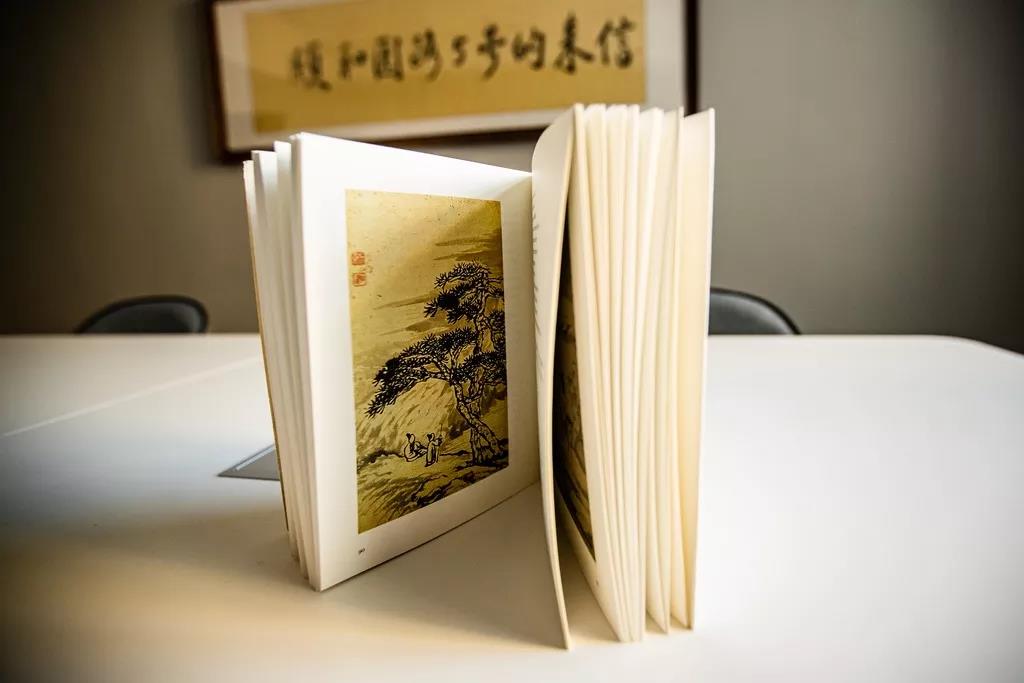
"Most of the time we are asking others to understand us; but the question is, have we understood them?" Dong perceived, "I became friends with Le Clézio and many French people because I first showed profound knowledge of and respect for their culture, then they could in turn be curious about ours." As a scholar long devoted to promoting Sino-French cultural communication for decades, Dong was the first Chinese literary scholar awarded the French Legion of Honor, the highest French order of merit for military and civil merits, in 2015. In his experience, inter-cultural communication is only possible when the two cultural parties treat each other as independent, equal entities, just as Li Bai and Mount Jingting. "As the poem says: 'Never tired of looking at each other – only the Jingting Mountain and me', Le Clézio and I are never tired of our communication because of such a mutual respect," Dong told us.
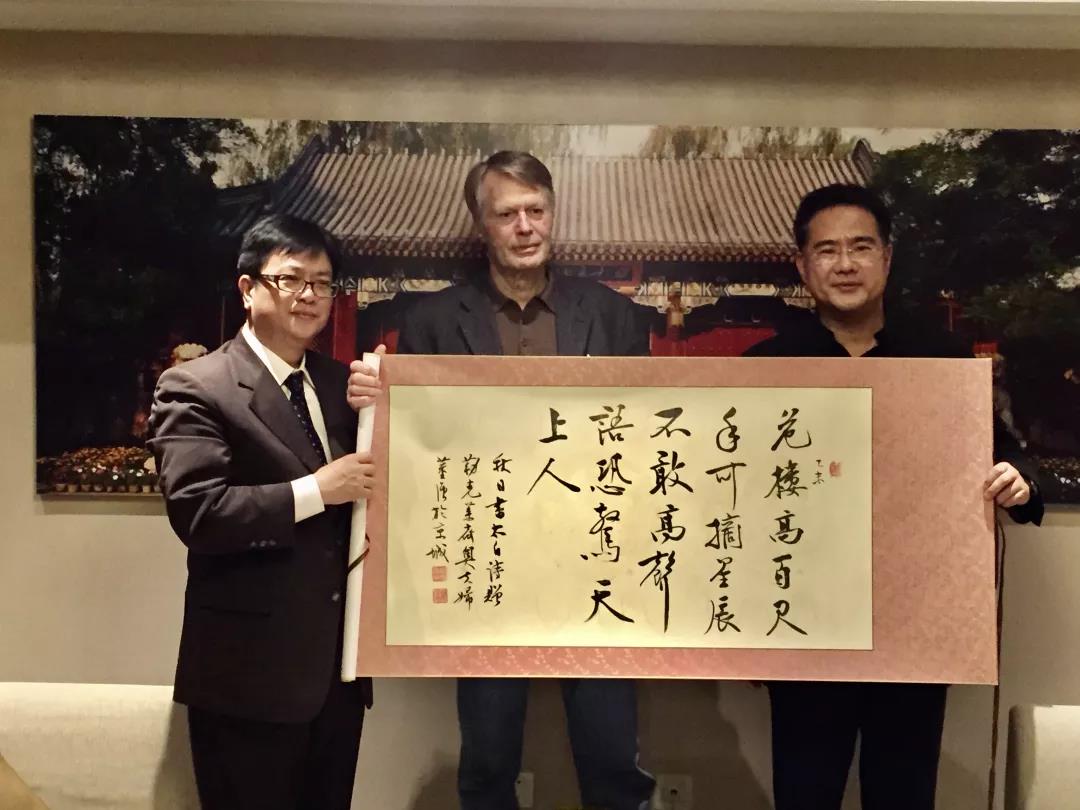
Mr. Li Yansong, then vice president of Peking University, on behalf of the school gives Dong's calligraphy work of Li Bai's poem as a gift to Le Clézio in 2015
Dong admitted his confidence that this collaboration represented one of the best ways to introduce the Chinese culture to the world: an influential, foreign voice, whose personal love of an aspect of the Chinese culture stands relatively independent and untampered. But the scholarly examination of a Chinese expert is also essential, who will be on the lookout for major deviance in this process. Earlier this year, BBC launched a documentary called 'Du Fu: China's Greatest Poet,' which was a big success, drawing viewers of all ages to the charm and beauty of traditional Chinese literature around the globe. However, the professor considered this new piece of literature with Le Clézio as a step further; a one-of-a-kind piece with deeper levels of literariness without losing its appeal to the general public.
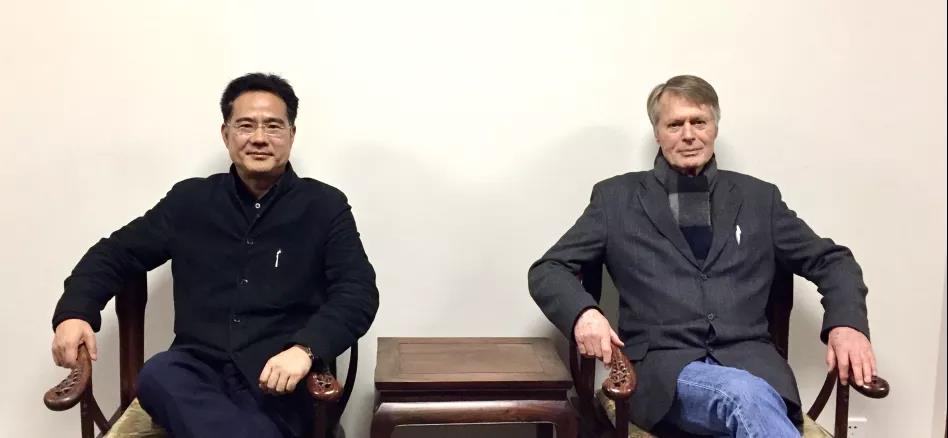
The duo decided not to require payment in advance or any additional recompenses despite their prestige in the literary circle and hard work put into the work. Their wish is to minimize the pressure for publishers so that they could focus on introducing the book to as broad an audience as possible. Professor Dong captures it best: "Tang Dynasty poems are transcendental because people of different ages and countries could not stop reading them, with new translations and new interpretations. Just let Mount Jingting take more readers as its friends."
About Dong Qiang
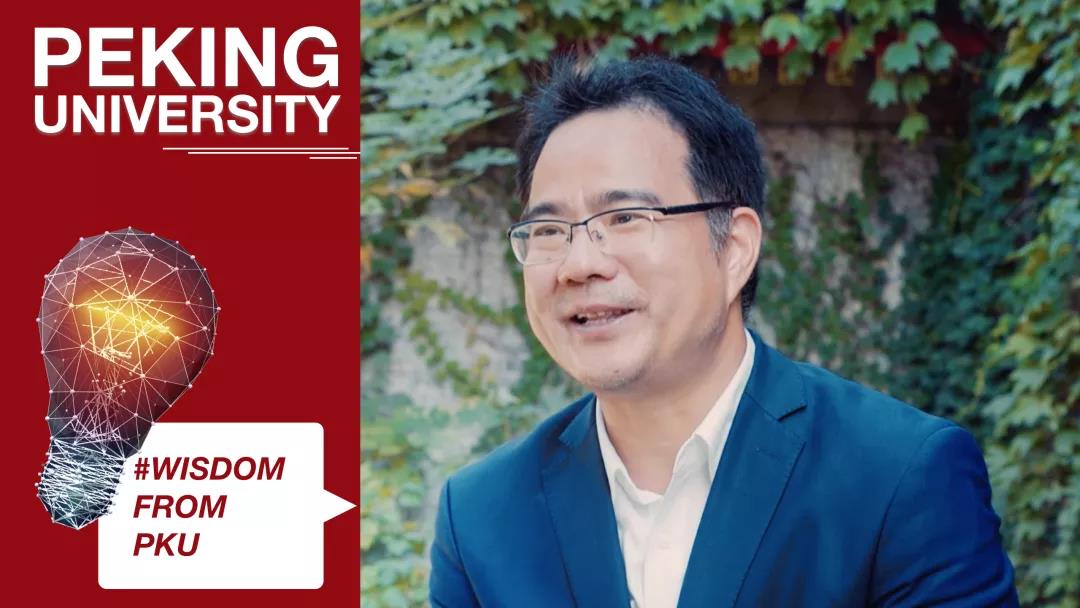
A laureate of La Grande Medaille de la Francophonie awarded by the French Academy, Professor Dong Qiang is a pioneer in French writing and French poems and has published numerous works, as a Chinese scholar in France. He also helped to set up a publishing house called "China Blue" in Paris, which has become an important platform for people from French-speaking countries to understand Chinese literature and culture.
Academically, Professor Dong did ground-breaking and authoritative research on Henry Michaud, a well-known French writer and painter, and on symbolism in 19th-century French literature and art. He has also contributed to exchanges between Chinese and French literature.
Written by: Ji Li
Edited by: Dickson David Agbaji
Photo credit to: Dong Qiang, Lv Chen